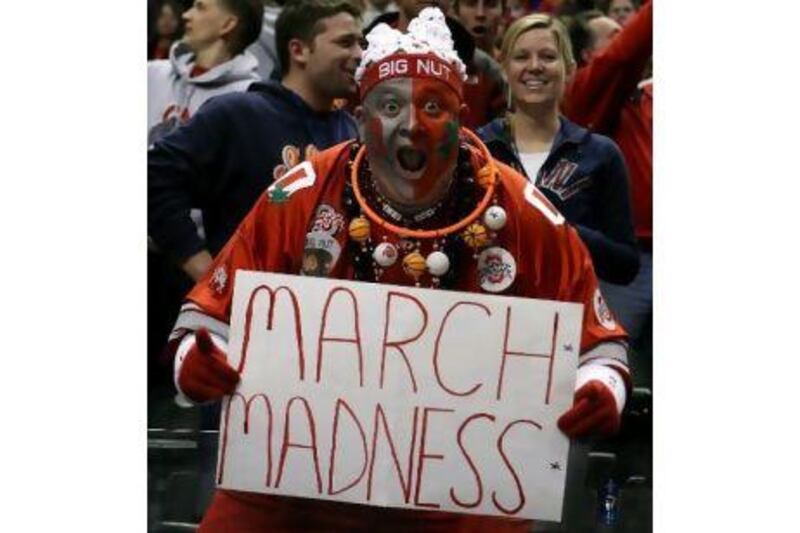A sign of madness is waking up one day and speaking in a strange language.
Another symptom is nervously referring to a sheet of paper containing names of universities, as if it were a tax audit notice or a map to buried treasure.
Another is sneaking constant peeks at your smart phone or internet web sites with the same anticipation as for a Facebook response from a long-lost friend.
If this is March in America, you probably are glancing at updates of men's college basketball's NCAA ournament. A few may involve teams dear to your heart. The rest hold your interest because of that precious sheet of paper.
March Madness, it is called, is a three-week passion play whose qualities and quirkiness make it America's most beloved sports tournament.
There are 68 teams in the Big Dance, as it is called, with a pulsating single-elimination format that begins with a number of David-v-Goliath match-ups, works its way through the Sweet 16 and the Elite Eight and culminates at the Final Four - the semi-finals and final to determine the national champion.
What elevates March Madness above the drama of other major sporting events - October baseball play-offs, the drum roll to American football's Super Bowl in January and the endless spring/summer of the NBA and NHL play-offs - can be found under "B" in your March Madness-to-English translation guide.
Bubble teams. Those are entrants among the last waved in by the selection committee before the door is shut. Until the field is announced, they are said to be "on the bubble". The term derives from a metaphorical bubble that pops when a team is left out.
Brackets. The sheets of paper that the madness-inflicted carry around in their pockets - and, nowadays, on their portable computers - contain a formatted graphic that lists the participating colleges down each side. With each round, advancing teams move along the bracket toward the middle. Your mission: predict as many winners as possible, especially the one at the centre on your sheet - the space reserved for the title game.
Bracket mania. It is a unifying force in America, played out with pools among work colleagues, classmates or friends who try to out pick each other, and is hardly confined to basketball devotees.
Have no idea what a Georgetown Hoya or a Texas A&M Aggie is? Cannot find Hampton, Bucknell or Wofford without a Guide To Top Colleges and a GPS? No worries. For every fan who pores over statistics and scouting reports to fill out their sheets, someone else bases his picks on school colours or mascots, or decide on the finalists by which schools their cousins attended.
(A Hoya, by the way, is a dog. An Aggie is shorthand for someone in agriculture. Hampton is in Virginia, Bucknell in Pennsylvania, Wofford in South Carolina.)
Buzzer-beater. Several games inevitably are determined by a basket in the closing seconds - barely beating the sound of the final buzzer. The television announcers come up with their own version of "Goalllllll!" to describe such shots as the scorer of said basket disappears beneath a pile of delirious teammates, cheerleaders and the school mascot.
If the buzzer-beater enhances your bracket, you do a little dance and brag about your Big Dance knowledge. Unless, of course, you are at your work cubicle, in which case you quietly clink two coffee mugs. (The creator of the computer Boss Button, a device that instantly hides a web browser or other windows from your approaching supervisor, was inspired by March Madness.)
Bracket-buster. This is a team projected (by you) to go far in the tournament that loses in the early rounds. That team's unexpected defeat ruins your forecasted outcomes. It busts your bracket.
Victims of bracket-busting are easy to spot. They screw up the sheet of paper that heretofore has been treated with the same care as a last will and testament, then slam-dunk it in the nearest bin. (Tip: print out your bracket on paper instead of referring to it on your smart phone or computer screen.)
The impact of March Madness has transcended sport in America. Experts estimate a US$1.2 billion (Dh4.4bn) loss of productivity by distracted workers. Brackets have become so recognisable that they are used comically to poke fun at crowded political elections and creatively for best-looking women or men contests.
The iconic US television show Saturday Night Live opened last weekend with a five-minute March Madness sketch.
Granted, the tournament is fraught with problems, from coaches earning millions of dollars in what is a supposed amateur sport to players mocking academia by barely unpacking for a year of college before heading to professional basketball's greener pastures.
But Americans block out those uncomfortable truths and climb into a world that mixes reality (actual games) with fantasy (pretending to be a sports genius).
Isn't that the very definition of madness?





